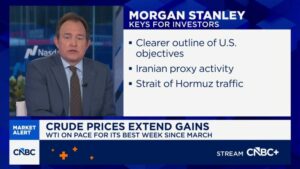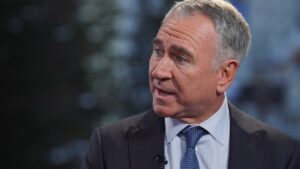Suppose someone handed me a chunk of cash to buy a passive income stock, but they set a few conditions.
The money has to go into a single FTSE 100 stock, and must be kept there for 10 years. Oh, and it must be a single company, with no investment trusts or anything like that allowed.
What would I buy?
That’s a tough one. My first instinct would have been to go for an investment trust, maybe something like Land Securities Group, with its forecast 6.1% dividend yield.
In fact, that real estate investment trust (REIT) is on my candidates list for my next Stocks and Shares ISA buy.
Please note that tax treatment depends on the individual circumstances of each client and may be subject to change in future. The content in this article is provided for information purposes only. It is not intended to be, neither does it constitute, any form of tax advice.
Finance stocks?
If that’s not allowed, my thoughts turn to the financial sector, maybe a bank or an insurer.
I already bought Lloyds Banking Group and Aviva shares, offering dividends of 5% and 7%, respectively. And I think I’d always want one of each sector in my ISA.
But we’ve seen in the past decade or so just how volatile finance stocks can be. Imagine I had my entire passive income stash in a bank just before the big financial crash of 2008!
That’s why diversification is so important. A balanced selection of stocks across a number of sectors can help us sleep better at night.
But let’s answer the question. If I had to pick just one passive income stock to hold for the next decade, I think it would have to be National Grid (LSE: NG.)
Dividend record
I’d go as far as to say I rate National Grid as probably the best income stock I’ve never bought. That’s all down to its dividend record, though that admittedly has been a bit shaken this year.
When the company announced its £7bn equity issue in May, it shattered an illusion.
National Grid would never change, and would just keep on doing the same thing and paying dividends. Oh, and the dividend per share would never fall.
Those thoughts are in a thousand peices now.
The new shares that were issued mean the dividend will be diluted. It’s rebased, that horrible ‘R’ word. Next year, there should be fewer pennies per share.
Ready for change
But we should realise that National Grid is a company like any other, and it’ll have changing needs.
Right now, we’re in the midst of major growth in renewable energy. And the network needs to be upgraded and enlarged to deal with it. That needs cash.
And it brings risk. Might we see another equity issue in the future? We might. And I think the share price could be a bit more volatile in the next few years, due to this new uncertainty.
But I’d still rate the 5.6% dividend yield on the cards for this year as possibly one of the FTSE 100’s safest. And forecasts have it growing again after next year’s small rebasement.
And safety is why, if I’m denied the ability to diversify and had to choose one passive income stock, I’d go for National Grid.
This post was originally published on Motley Fool







